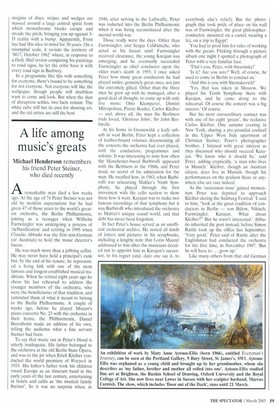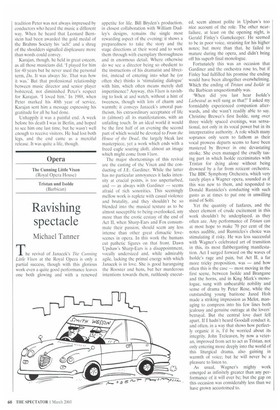A life among music's greats
Michael Henderson remembers his friend Peter Steiner, who died recently
Aremarkable man died a few weeks ago. At the age of 74 Peter Steiner was not old by modern expectations but he had given 47 of those years to the world's greatest orchestra, the Berlin Philharmonic, joining as a teenager when Wilhelm Furtwangler was undergoing a process of 'cleNazification' and retiring in 1995 when Claudio Abbado was the first non-German (or Austrian) to hold the music director's baton.
He was much more than a jobbing cellist. He may never have held a principal's rank but, by the end of his tenure, he represented a living link with one of the most famous and longest-established musical traditions. When he retired eight years ago he chose his last rehearsal to address the younger members of the orchestra, who were the beneficiaries of that tradition, and reminded them of what it meant to belong to the Berlin Philharmonic. A couple of weeks ago, before he played Mozart's piano concerto No. 23 with the orchestra in their home, the Philharmonie, Daniel Barenboim made an address of his own, telling the audience what a fine servant Steiner had been.
To say that music ran in Peter's blood is utterly inadequate. His father belonged to the orchestra at the old Berlin State Opera, and was in the pit when Erich Kleiber conducted the world premiere of Wozzeck in 1924. His father's father took his children round Europe as an itinerant band in the early years of the last century, entertaining in hotels and cafés as 'the musical family Steiner'. So it was no surprise when, in
1948, after serving in the Luftwaffe, Peter was inducted into the Berlin Philharmonic when it was being reconstituted after the second world war.
Those really were the days. Other than Furtwangler, and Sergiu Celibidache, who acted as his locum until Furtwangler received clearance, the young Karajan was emerging, and he eventually succeeded Furtwangler as chief conductor upon the older man's death in 1955, I once asked Peter how many great conductors he had played under, genuinely great ones, not just the extremely gifted. Other than the three men he grew up with he managed, after a good deal of thought, to come up with only five more: Otto Klemperer. Dimitri Mitropolous, Pierre Boulez, Carlos Kleiber — and, above all, the man the Berliners truly loved, 'Glorious John', Sir John Barbirolli, At his home in Grunewald, a leafy suburb in west Berlin, Peter kept a collection of leather-bound volumes documenting all the concerts the orchestra had ever played, with the conductors, programmes and soloists. It was interesting to note how often the Manchester-based Barbirolli appeared with the Berliners in the 1960s, and Peter made no secret of his admiration for the man. He recalled how, in 1963, when Barbirolli was rehearsing Mahler's Ninth Symphony, he played through the first movement with the cello section to show them how it went. Karajan was to make two famous recordings of that symphony but it was Barbirolli who introduced the orchestra to Mahler's unique sound world, and that debt has never been forgotten.
In fact Peter's house served as an unofficial orchestral archive. He stored all kinds of letters and pictures in his scrapbooks, including a lengthy note that Lorin Maazel addressed to him after the musicians decided not to appoint him as Karajan's successor, to his regret (and, dare one say it, to everybody else's relief). But the photograph that took pride of place on his wall was of Furtwangler, the great philosopherconductor, mounted on a camel, wearing a fez, on a trip to Egypt!
You had to prod him for tales of working with the greats. Flicking through a picture album one night I spotted a photograph of Peter with a very familiar face.
'That's you, Peter. with Stravinsky!'
'Is it? Are you sure? Well, of course, he used to come to Berlin to conduct us.'
'And this is you with Shostakovich!'
'Yes, that was taken in Moscow. We played his Tenth Symphony there with Karajan, and he came along to the rehearsal. Of course the concert was a big success.' Of course.
But his most extraordinary contact was with one of his eight 'greats', the reclusive Carlos Kleiber. One autumn evening in New York, sharing a pre-prandial cocktail in the Upper West Side apartment of Christian Steiner, Peter's photographer brother, I listened with great interest as they discussed who should succeed Karajan. 'We know who it should be,' said Peter, adding cryptically, 'a man who lives in Munich.' Kleiber, though an Austrian citizen, does live in Munich, though his performances on the podium there or anywhere else are rare indeed.
As the 'succession issue' gained momentum Peter was deputed to approach Kleiber during the Salzburg Festival. 'I said to him, "look at the great tradition of conductors in Berlin — von Billow, Nikisch, Furtwangler, Karajan. What about Kleiber?" But he wasn't interested.' Abbado inherited the post instead, before Simon Rattle took up the office last September. 'Very good,' Peter said of Rattle after the Englishman had conducted the orchestra for the first time, in November 1987. 'But he will have to ... grow up.'
Like many others from that old German tradition Peter was not always impressed by conductors who heard the music a different way. When he heard that Leonard Bernstein had been awarded the gold medal of the Brahms Society his `achr and a shrug of the shoulders signalled displeasure more than words could convey.
Karajan, though, he held in great esteem, as all those musicians did. 'I played for him for 40 years but he never used the personal term, Du. It was always Sic. That was how it was.' But that professional relationship between music director and senior player bolstered, not diminished Peter's respect for Karajan. 'I loved him.' In 1988, when Peter marked his 40th year of service. Karajan sent him a message expressing his gratitude for all he had done.
Unhappily it was a painful end. A week before his death I was in Berlin, and hoped to see him one last time, but he wasn't well enough to receive visitors. He had lost both legs, and the end came as a merciful release. It was quite a life, though.



















































































 Previous page
Previous page